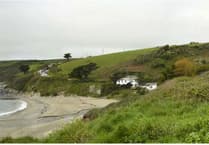MANY of us start the new year by digging our gardens so they are all ready to receive new plants in the spring. The current horticultural advice is: Don’t do it. Save your back!
Soil is the most complicated and life-rich habitat in your garden and digging just destroys a lot of what you should be aiming to keep and releases greenhouse gases into the atmosphere.
Plants have always grown in undisturbed soil so there is no reason why the cultivated plants should not be treated in the same way.
Farmers are starting to realise this in their moves to regenerative farming where permanent pasture is encouraged.
The weeds are still a challenge to be dealt with but perhaps with not quite the same zeal. One or two are unlikely to affect the ability of a plant to produce seeds, fruit or flowers.
The accepted method of dealing with them is mulching. This is the way that soils have developed over thousands of years. Organic matter falls onto the surface and it is broken down by soil microbes, fungi and animals and incorporated into the upper layers of the soil.
Earthworms are a particularly important feature of this process and they also improve the drainage and water storage capacity of the soil, even heavy clay soils. Lighter soils need the organic matter to improve fertility.
Mulching is best done with a good thick layer of organic material. Ideally this should be your own homemade compost but there are alternatives; well-rotted horse manure, spent mushroom compost, grass clippings, old woollen jumpers or carpeting, spent hops, chipped woody garden trimmings or chippings from your local tree surgeon can all be used, ideally placed on top of a layer of old cardboard boxes.
It is necessary to remove as many perennial weeds as you can: dandelions, bindweed, docks, thistles, brambles etc.
These can be individually removed or they can be smothered with a light-excluding membrane like black polythene but this should be in place for up to six months. Use recycled plastic like old compost bags.
Article from CASA (Climate Action St Austell)





Comments
This article has no comments yet. Be the first to leave a comment.